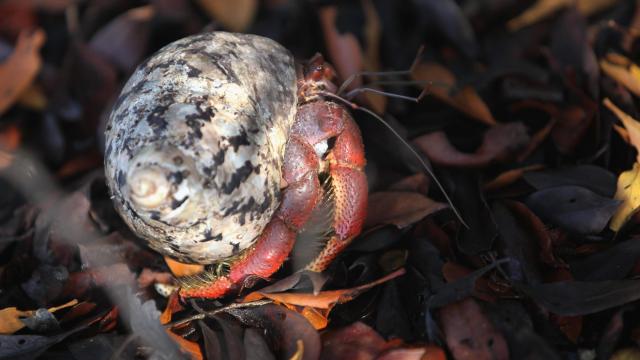Have you ever been turned on by someone — or something — you knew was trash? Reading the news today, you’d think that was happening to crabs. A number of media outlets have reported that crabs are horny for plastic pollution. While I love a horny crab as much as the next person, I have some bad news: New research discusses crabs being attracted to marine plastic, but no, not like that. The findings suggest the crabs are drawn to the trash because it smells like their food, which is actually quite sad and a dire warning about how our waste disrupts marine ecosystems.
Oleamide, a compound that is leaked from marine plastic pollution but also occurs naturally in many animals, seems to stimulate the crabs, perhaps because they associate the molecule with food, according to a study published in the journal Marine Pollution Bulletin on Tuesday.
The report is authored by scientists from the the University of Hull and is based on their observations of 40 crabs found off the coast of Yorkshire, England. The authors found that when exposed to low concentrations of the substance, the crustaceans’ hearts started to race, indicating excitement.
“Our study shows that oleamide attracts hermit crabs,” PhD candidate Paula Schirrmacher, who worked on the report, said in a statement. “This research demonstrates that additive leaching may play a significant role in the attraction of marine life to plastic.”
The findings didn’t come as a total surprise. Oleamide is added to plastic to give it slip and lubrication, but it’s also a naturally occurring molecule in animals that seems to impact sleep and other biological processes. Some people even take oleamide as a so-called nootropic supplement, in hopes that it may boost their brain health or aid in getting enough sleep.
Oleamide is also similar to a molecule emitted by some decomposing animals. That means hermit crabs, which are scavengers, may traverse long distances because they smell what they think is dinner, only to discover plastic waste instead. This may lead to hermit crabs spending more time around plastic and ingesting it, which is bad news. Previous research shows that exposure to plastic impairs the creatures’ cognitive abilities, leaving them incapable of choosing optimal shells to live in. That could in turn make them much more vulnerable to predators.
The study shows how environmental degradation can have all sorts of bizarre, unforeseen consequences. Without urgent changes, those problems will only get worse.
If we don’t undertake widespread policy changes, the world is on track to triple the amount of plastic dumped into the seas within just two decades. Leaders can avert that horrible fate and begin to undo the long legacy of marine ocean pollution by enacting major regulations and taking on the fossil fuel industry, which produces plastic. And as this week’s major United Nations report showed, we should be doing that anyway.
